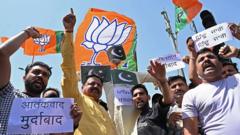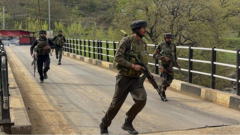The recent killing of 26 tourists in Kashmir, attributed to militants, reignites fears of escalating tensions between India and Pakistan. The article delves into the historical context of the Kashmir dispute, examining factors contributing to the conflict.
Escalating Violence in Kashmir: A Historical Context

Escalating Violence in Kashmir: A Historical Context
Recent terror attacks in Kashmir highlight ongoing tensions between India and Pakistan over the disputed region, reminiscent of past conflicts.
A terrorist attack in Kashmir on Tuesday claimed the lives of at least 26 tourists and left many injured, marking one of the gravest assaults on civilians in the region in recent years. Indian authorities have labeled the incident as a terrorist attack, drawing comparisons to a similar spike in violence that almost pushed India and Pakistan into war in 2019.
While no group has officially claimed responsibility for the attack, India has traditionally pointed fingers at Pakistan, which has consistently denied involvement. This attack adds to the intricate and fraught backdrop of Kashmir's history—a region whose fate has been disputed since the partition of British India in 1947, which divided the land into predominantly Hindu India and Muslim-majority Pakistan.
The conflict over Kashmir began when the Hindu ruler of the then princely state chose neutrality during the partition process but later opted to join India amid incursions by Pakistani tribal forces. This decision sparked immediate military confrontations, leading to India retaining control over approximately two-thirds of the territory while Pakistan occupies the remaining third.
Kashmir’s landscape is picturesque, but its political climate is fraught with historical grievances that have led to widespread violence among its diverse populace. The population remains split along ethnic lines with political factions advocating for either independence or integration with India or Pakistan.
The ongoing violence highlights the fragile peace that exists in the region, prompting concerns that the latest attack could escalate tensions between the two nuclear-armed neighbors. Consequently, international observers closely monitor the situation, reminding the global community of the continuing legacy of one of the world's most protracted geopolitical conflicts.




















